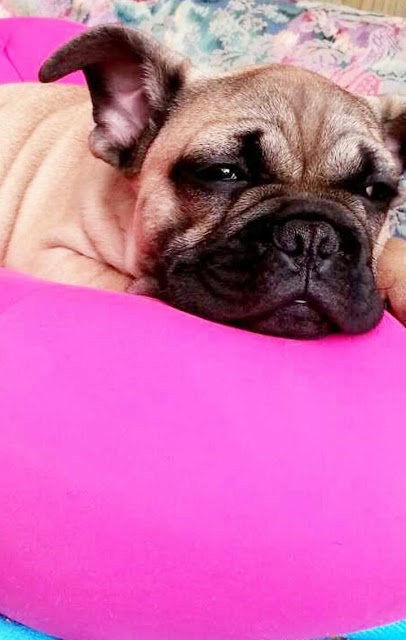Coconut oil is excellent as an aid towards your healthy frenchie. It is so beneficial to them that it's silly not to give it a go!
Now I won't lie I have only used it for a couple of months on my 2 but they love it!
Most of the coconut oil benefits come from the MCTs. For example, the lauric acid in coconut oil has antibacterial, antiviral, and anti-fungal properties. Capric and caprylic acid have similar properties and are best known for their anti-fungal effects.
According to Dr. Bruce Fife, certified nutritionist and naturopathic doctor, coconut oil gently elevates the metabolism, provides a higher level of energy and vitality, protects your frenchie from illness, and speeds healing. As a bonus, coconut oil improves any dog’s skin and coat, improves digestion, and reduces allergic reactions.
Im not going to go ahead and bore you with all the science behind it, but just show you the benefits.
Fed regularly to your frenchie, coconut oil may have multiple benefits:
Skin Conditions - as frenchie owners we know that our little furbabies are prone to skin trouble and allergies!
Clears up skin conditions such as eczema, flea allergies, contact dermatitis,and itchy skin
Reduces allergic reactions and improves skin health
Makes coats become sleek and glossy, and deodorizes doggy odor
Prevents and treats yeast and fungal infections, including candida
Disinfects cuts and promotes wound healing
Applied topically, promotes the healing of cuts, wounds, hot spots, dry skin and hair, bites and stings
Digestion - we have all experienced the bad games that come from both ends of our frenchie's!
Improves digestion and nutrient absorption
Aids healing of digestive disorders like inflammatory bowel syndrome and colitis
Reduces or eliminates bad breath in dogs
Reduces gas and flatulence
Aids in elimination of hairballs and coughing
Immune System, Metabolic Function, Bone Health
Contains powerful antibacterial, antiviral, and anti-fungal agents that prevent infection and disease
Regulates and balance insulin and promotes normal thyroid function
Helps prevent or control diabetes
Helps reduce weight, increases energy
Aids in arthritis or ligament problems
There's a couple of ways you can give it to your frenchie, I tend to melt it down and wait for it to cool then drizzle into their food, you can add it in solid, or if they aren't keen on it try smothering there favorite treats in it! I give my two a tea spoon each a day and I can tell the difference!
Make sure it's organic, raw, virgin coconut oil you get! So give it a try! There's too many benefits not too!









